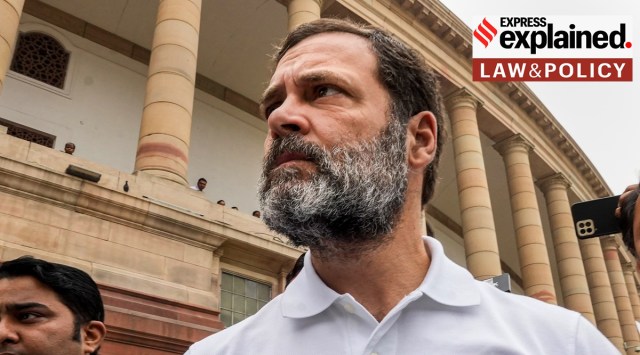Rahul Gandhi has been convicted, but what happens to his MP status? Here’s what the law says
With Rahul Gandhi's conviction, his status as a Member of Parliament has come under the spotlight. Can he be disqualified? Here is what the law says.
 Rahul Gandhi was sentenced to two years in jail in a 2019 defamation case. (PTI Photo/Kamal Singh)
Rahul Gandhi was sentenced to two years in jail in a 2019 defamation case. (PTI Photo/Kamal Singh) Congress leader Rahul Gandhi was on Thursday (March 23) held guilty and sentenced to two years in jail in a 2019 defamation case over his remarks about the “Modi surname” by a court in Gujarat’s Surat.
Gandhi allegedly said “how come all the thieves have Modi as the common surname?” during a rally in Kolar, Karnataka in the run-up to the 2019 Lok Sabha elections.
Boggled by this. Defamation law 101 is that references to a generic class of persons are not actionable unless an individual can show a direct reference to *themselves.*
It’s one of the first things you learn in defamation law class. https://t.co/caHbWoWmc2
— Gautam Bhatia (@gautambhatia88) March 23, 2023
The court of Chief Judicial Magistrate HH Varma, which held Gandhi guilty under Indian Penal Code sections 499 and 500, also granted him bail and suspended the sentence for 30 days to allow him to appeal in a higher court, the Congress leader’s lawyer Babu Mangukiya said.
Gandhi’s conviction has led to questions over his status as a Member of Parliament from Wayanad, Kerala. Sources from the Lok Sabha Speaker’s office told The Indian Express, “Let the order come to the Speaker’s office along with a complaint to disqualify him. If a complaint with the order comes to the table, which has legal experts, will examine and take a decision.”
Can this conviction disqualify Rahul Gandhi as an MP?
The disqualification of an MP convicted for an offence can happen in two instances.
First, if the offence for which he is convicted is listed in Section 8(1) of the Representation of the People Act of 1951. This includes certain specific offences such as promoting enmity between two groups, bribery and undue influence or personation at an election. Defamation does not fall under this list.
Second, if the lawmaker is convicted for any other offence but is sentenced for a period of two years or more. Section 8(3) of the RPA mandates that an MP can be disqualified if convicted and sentenced to not less than two years of imprisonment.
How does an appeal against the conviction impact disqualification?
Section 8(4) also states that the disqualification takes effect only “after three months have elapsed” from the date of conviction. Within that period, Gandhi can file an appeal against the sentence before the High Court.
But, while the law had initially provided for a pause on disqualification if an appeal against the conviction was filed before a higher court, in the landmark 2013 ruling in ‘Lily Thomas v Union of India’, the Supreme Court struck down Section 8(4) of the RPA as unconstitutional.
This means that simply filing an appeal will not be enough but the convicted MP must secure a specific order of stay against the conviction of the trial court. Significantly, the stay cannot merely be a suspension of sentence under Section 389 CrPC but a stay of conviction.
Under Section 389 of the CrPC, an Appellate Court can suspend the sentence of a convict while the appeal is pending. This is akin to releasing the appellant on bail.






































